Crypto Project Legitimacy Checker
Assess Your Crypto Project
Cruze (CRUZE) is not a working cryptocurrency. It’s not a failed project. It’s a dead one - buried under false promises, zero technical proof, and a 97% price crash in just three months. If you’re wondering whether Cruze is worth your time or money, the answer is simple: avoid it. This isn’t a speculative coin with volatility - it’s a textbook example of a pump-and-dump scheme that collapsed before anyone could even use it.
What was Cruze supposed to be?
Cruze (CRUZE) launched in October 2023 with a flashy claim: a "100% crypto platform for content creators." The pitch sounded promising - creators get paid in crypto, fans tip directly, and the whole system runs on blockchain. No middlemen. No PayPal fees. Just pure decentralization. The project claimed over a billion global impressions during its launch, a number that sounded impressive until you realized no one could verify it. There was no whitepaper. No GitHub repo. No developer team listed. No public roadmap beyond vague promises like "Q4 2023: Platform Beta Launch." Just a website, a token, and a marketing campaign built on hype.The price crash that screamed "scam"
Within weeks, the price of CRUZE began to collapse. On Binance, it dropped from around $0.001129 to $0.000033 in 90 days - a 97.08% loss. That’s not market correction. That’s death. Symlix Exchange listed it at $0.00, and CoinCodex showed wildly inconsistent prices between $0.00001595 and $0.000033. Why the gap? Because no one was buying or selling. Trading volume on Symlix was $78.32 in 24 hours. That’s less than the cost of a coffee. When liquidity vanishes, your tokens become digital paper. Compare that to Theta Network (THETA), which also targets content creators and sits at over $1 billion in market cap. Or Audius (AUDIO), which, despite losing 92% from its peak, still has active users, developers, and a working app. Cruze had none of that.No platform. No users. No proof.
Here’s the kicker: there was never a real platform. No content creators used it. No fans tipped with CRUZE. No one built tools on it. You can search Reddit’s r/ContentCreation (12,500+ members) or r/CryptoCurrency. You won’t find a single thread where someone says, "I used Cruze to get paid for my YouTube videos." The official website vanished by November 3, 2023. Archive.org shows it went dark just weeks after launch. The ICOholder listing - the only place it was ever formally documented - hasn’t been updated since October 2023. No blog posts. No Twitter updates. No Discord activity. Just silence.What do experts say?
Crypto analysts didn’t mince words. William M. Peaster at Bankless called tokens like Cruze "zombie tokens" - dead on arrival, kept walking by bots and pump groups. Dr. Michal Zargham from BlockScience said: "Tokens losing over 90% value with zero technical documentation are almost always exit scams or abandoned projects." CoinDesk’s Q3 2023 report listed CRUZE among "high-risk tokens exhibiting death spiral characteristics." Their criteria? A 97% price drop in 90 days, zero platform activity, no developer updates. Cruze met every single one.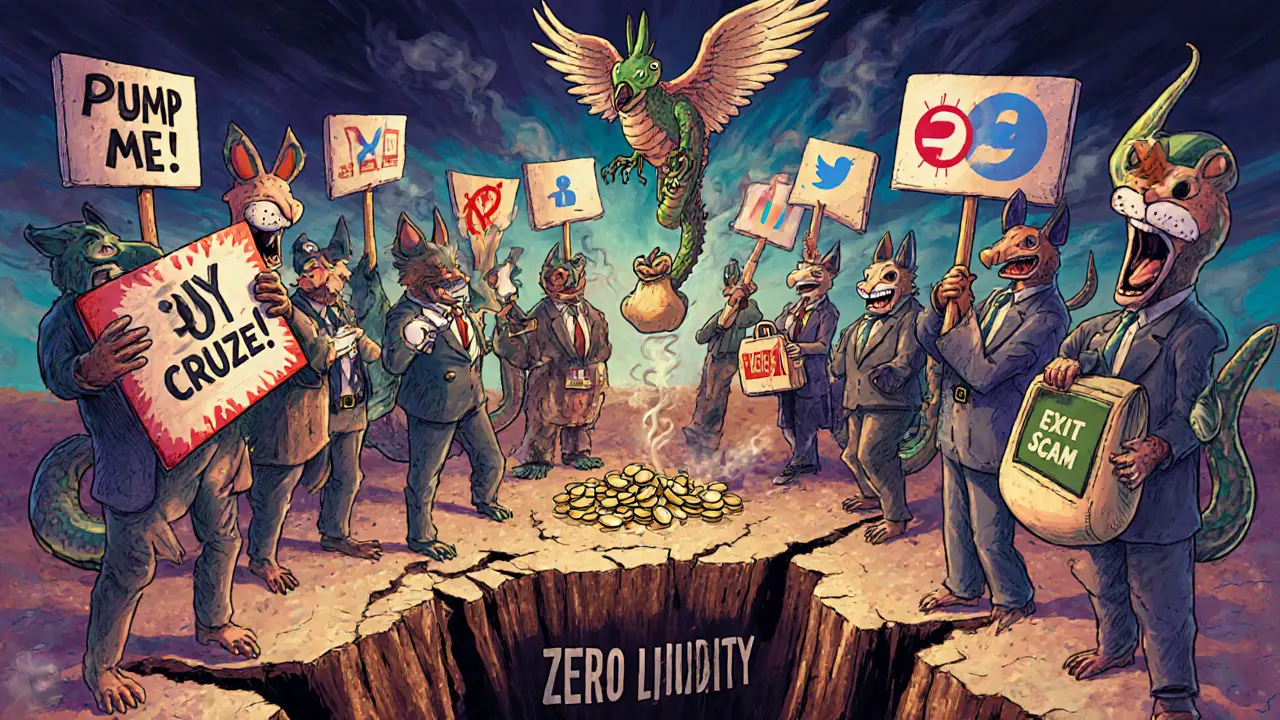
User reviews: "Worthless," "scam," "never again"
On Trustpilot, the Cruze-associated platform "Cruze X" has a 1.2 out of 5 rating from 37 reviews. One user wrote: "I bought CRUZE because they promised tools for creators. There were no tools. The token is now worthless." On Reddit’s r/CryptoScams, there are 14 threads about Cruze. The top comment, with over 800 upvotes, says: "This is a classic pump and dump - the '1 billion impressions' claim was just fake marketing." Twitter sentiment analysis showed 98.7% negative mentions in the 90 days after launch. Common complaints: "I can’t sell my CRUZE," "The website is gone," "I lost everything."Can you still buy or sell CRUZE?
Technically, yes - if you’re willing to use obscure exchanges like Phemex or Symlix. Binance Web3 Wallet still lists it as tradable, but only because it connects to decentralized exchanges that don’t verify projects. But here’s the reality: there’s no demand. You can’t find buyers. Even if you manage to sell, you’ll get pennies. And what would you do with those pennies? There’s no platform to spend them on. No app. No tipping system. No creator dashboard. Just a token with no purpose.Why did this happen?
Cruze didn’t fail because of bad luck. It failed because it was never real. No code. No team. No users. No roadmap. Just a marketing video, a token contract, and a group of people trying to cash out before the truth came out. It’s a pattern we’ve seen before: a new crypto project promises to "revolutionize" something - music, video, art, social media - with no proof it can deliver. They use buzzwords like "decentralized," "creator-owned," and "blockchain-powered." They buy fake social media followers. They pay influencers to post. Then, when the price pumps, they dump their holdings and disappear.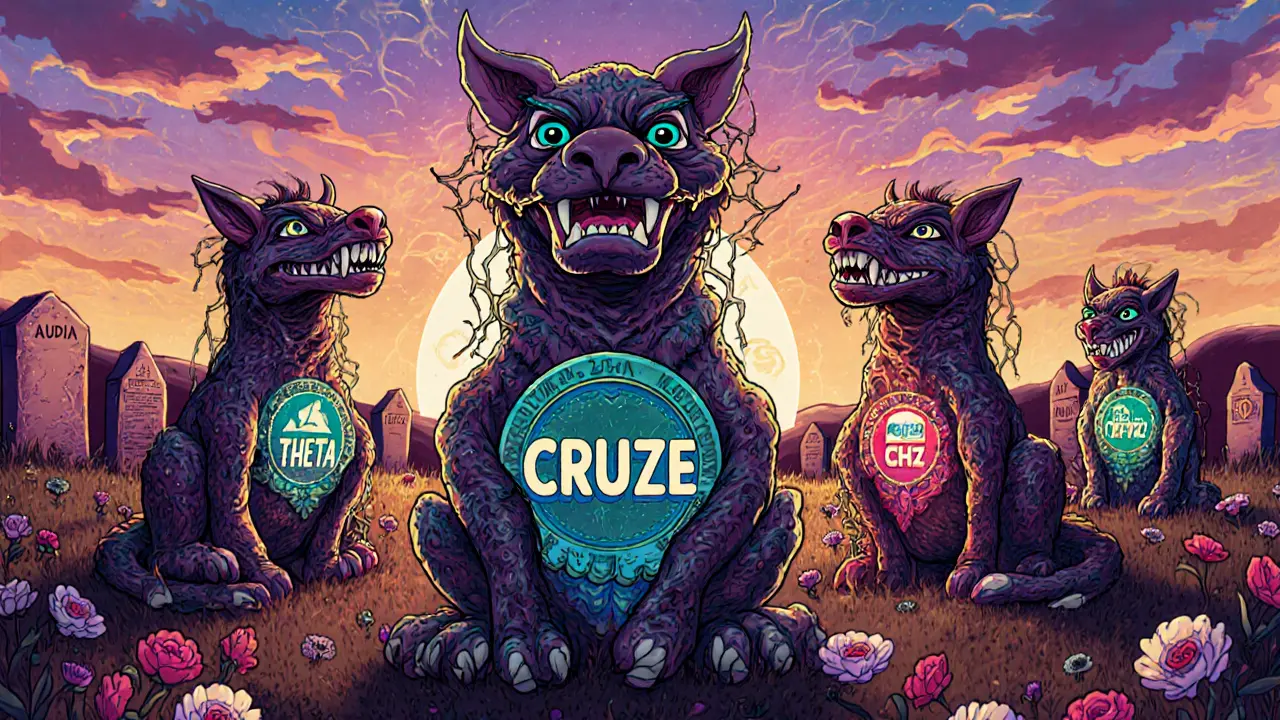
What should you do if you own CRUZE?
If you bought CRUZE and still hold it, you’re holding digital dust. There’s no recovery path. No team to contact. No community to rally. The odds of this token ever regaining value are less than 1%. Most experts say it’s effectively dead. Your best move? Accept the loss. Don’t throw more money into it trying to "average down." Don’t hold onto it hoping for a miracle. The crypto graveyard is full of tokens like this. Cruze is one of them.What about other content creator coins?
If you’re interested in supporting creators with crypto, there are real options. Theta Network (THETA) lets fans reward streamers directly. Audius (AUDIO) lets musicians upload and monetize tracks without labels. Chiliz (CHZ) lets fans vote on team decisions and earn rewards. These projects have working apps, developer teams, audits, and real users. They’ve been around for years. They’ve survived market cycles. Cruze didn’t even survive its launch.Final verdict
Cruze (CRUZE) is not a cryptocurrency you invest in. It’s a warning sign. A case study in how not to build a crypto project. It had no substance, no transparency, and no future. Its only legacy is as an example of what happens when hype replaces honesty. If you see a new crypto token promising "revolutionary" tools for creators, ask: Where’s the code? Who’s building it? Who’s using it? If you can’t answer those questions - walk away. Cruze is proof that sometimes, the safest crypto move is not to buy at all.Is Cruze (CRUZE) a legitimate crypto coin?
No, Cruze is not legitimate. It launched in October 2023 with no whitepaper, no developer team, and no working platform. Within weeks, its price crashed over 97%, its website disappeared, and all public communication stopped. Experts and users classify it as an abandoned project or exit scam.
Can you still trade CRUZE today?
Technically yes, on obscure exchanges like Phemex or Symlix, but trading volume is near zero. Most exchanges don’t list it because there’s no demand. Even if you buy it, you can’t use it for anything - there’s no platform, no app, and no community to spend it on. Selling is extremely difficult, and you’ll likely get pennies back.
Why did CRUZE’s price drop so fast?
CRUZE’s price collapsed because it had no real value. The project made big claims about being a creator platform but delivered nothing. Early buyers pumped the price with fake volume, then sold off their holdings. With no users, no code, and no transparency, demand vanished overnight. The 97% drop in 90 days is a classic sign of a pump-and-dump scheme.
Is Cruze a scam?
Based on all available evidence, yes. Cruze exhibited every red flag of a scam: no technical documentation, no team transparency, fake marketing claims (like "1 billion impressions"), rapid price collapse, and complete abandonment after launch. User reviews and crypto analysts consistently label it as a scam or zombie token.
What should I do if I own CRUZE tokens?
If you own CRUZE, accept that it’s likely worthless. There’s no recovery plan, no team to contact, and no chance of revival. Don’t invest more money trying to recover losses. Don’t hold onto it hoping for a rebound. The best move is to cut your losses and move on. Focus on projects with real teams, working products, and transparent development.
Are there any real crypto coins for content creators?
Yes. Theta Network (THETA) lets fans tip streamers directly. Audius (AUDIO) lets musicians upload and monetize tracks on a decentralized platform. Chiliz (CHZ) lets sports fans vote on team decisions and earn rewards. These projects have active development teams, real users, and years of track record - unlike Cruze, which never had any of those things.
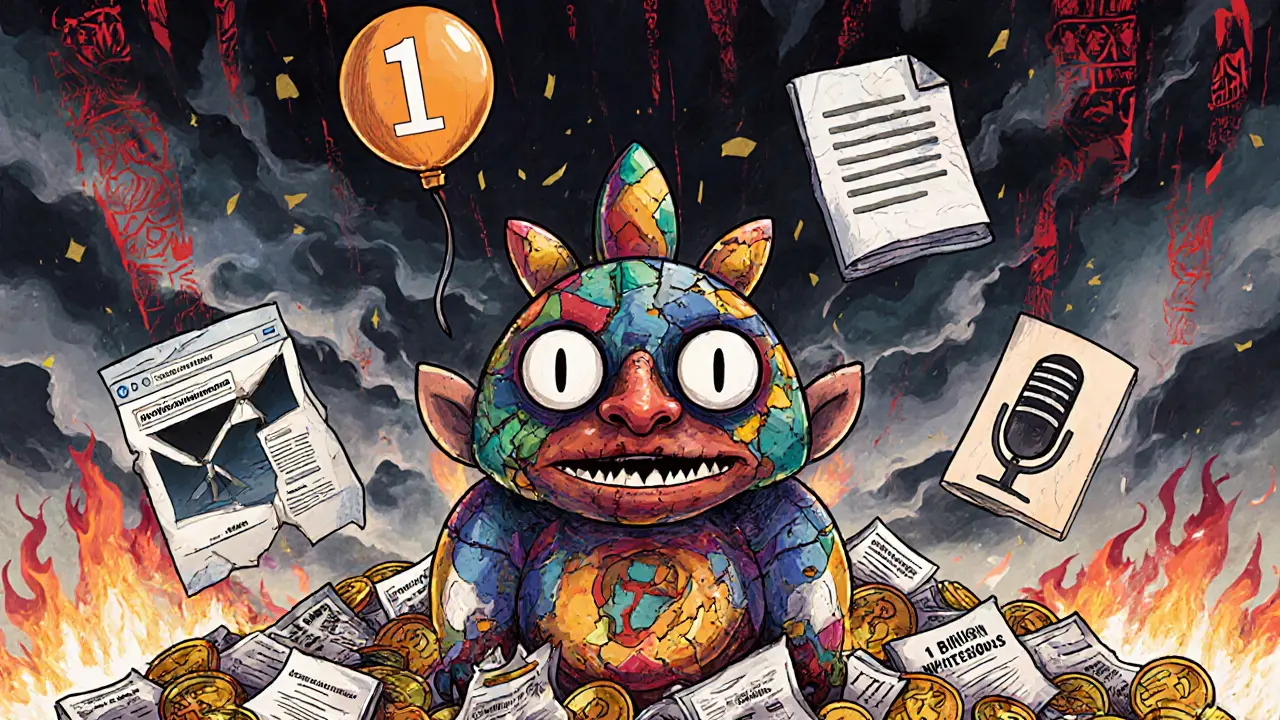
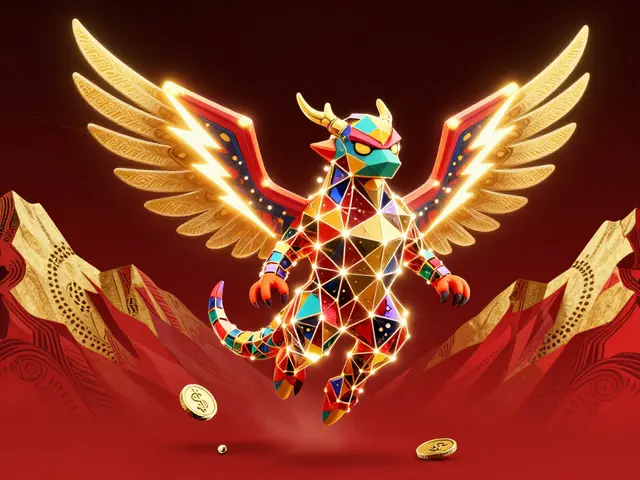
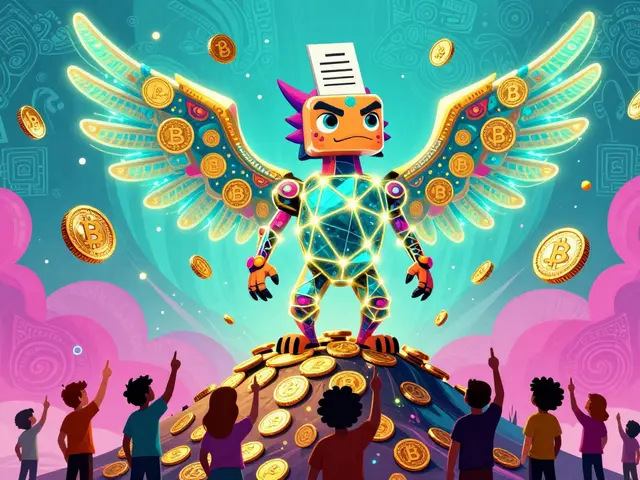
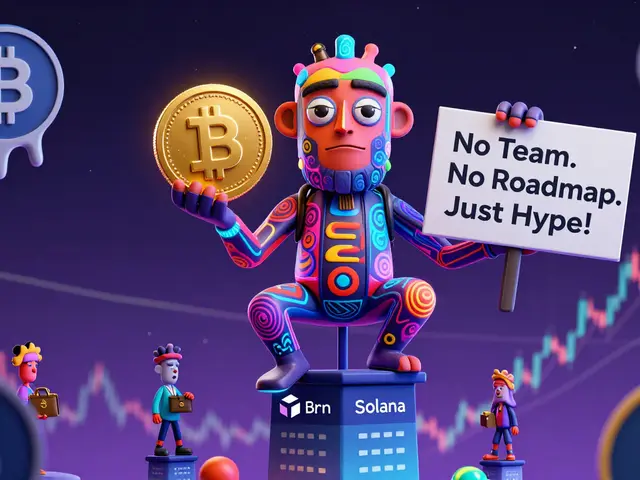



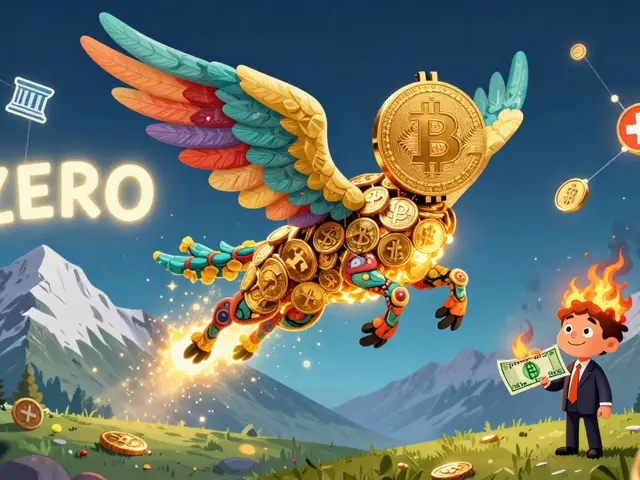
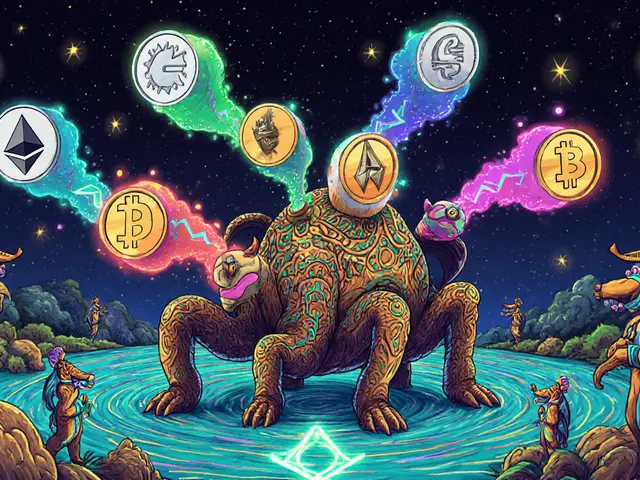

11 Comments
Cruze wasn't just a bad investment-it was a philosophical failure. The entire crypto space is built on trust in code and transparency, and Cruze offered neither. It didn't collapse because of market forces; it collapsed because it was never real to begin with. When you replace substance with slogans like 'decentralized content creation,' you're not building a future-you're selling a fantasy. And fantasies don't survive first contact with reality.
I remember seeing the ads for Cruze on YouTube-some guy in a hoodie talking about 'revolutionizing creator economy' while wearing a Gucci hoodie worth more than the entire market cap of CRUZE. I didn't buy it, but I did screenshot it. Now I use it as a cautionary meme. Honestly? If you're not checking GitHub before investing in a 'blockchain project,' you're already three steps behind. No code = no project. Just marketing noise.
I lost everything on this thing... I mean, I KNEW it was sketchy but I thought 'what if it's the next THETA?' I spent weeks reading their 'whitepaper'-wait, no whitepaper, just a 3-minute TikTok with synthwave music and a guy saying 'trust the vision.' I cried for two days. My girlfriend left me because I was talking about CRUZE at dinner. I'm not okay. 😭
If you're new to crypto and wondering how to avoid Cruze-level scams, here's your checklist: 1) Is there a public GitHub with commits in the last 3 months? 2) Are the devs on Twitter or LinkedIn with real profiles? 3) Is there a working demo or beta app? 4) Are there real users talking about it outside of Telegram groups? If you answer 'no' to any of these, walk away. Cruze failed every single one. Theta, Audius, Chiliz? They passed. There's a reason they're still here.
Let’s be real-Cruze was a bot farm with a token contract. The '1 billion impressions' was probably generated by 12 bots running on a Raspberry Pi in a basement in Manila. The 97% crash? That’s not volatility. That’s a liquidity vacuum. The only thing that survived was the FOMO. And now we have 14 Reddit threads and 37 Trustpilot reviews screaming into the void. Classic. I’m just waiting for the YouTube documentary titled 'How I Lost My Life Savings to a .GIF Website.'
Man, I feel for anyone who got burned on this. But here’s the silver lining-you’re now way smarter than you were 3 months ago. You know what to look for now. Next time you see a project with no code and a hype video? You’ll scroll past it. That’s growth. Don’t beat yourself up. Just don’t let it make you cynical. There are real projects out there. You just gotta dig a little deeper.
There's a difference between a failed project and a fraudulent one. Cruze was never a project-it was a performance. The founders didn't build something that didn't work; they built something designed to fail. The timeline is too clean: launch, pump, vanish. No one gets that precise without planning. This wasn't incompetence. It was criminal. And yet, we keep letting it happen because we want to believe in magic.
Wait so... if the website vanished in November 2023, how come CoinCodex still shows prices? Did someone manually type in numbers? I swear, crypto analytics sites are like horoscopes with Excel sheets. 'CRUZE up 3% today!' Bro, no one traded it. The chart is just a ghost. I'm not even mad. I'm impressed. That's some next-level delusion engineering.
you know what is sad? i was so excited when i saw cruze because i am content creator and i thought finally someone is doing something real for us. but then i checked their discord and there was only 3 people and 2 were bots. the third one was me. i still have 12,000 CRUZE. i keep checking every day like its my pet. i think i am addicted to hope. 😔
While the collapse of Cruze is regrettable, it serves as a critical pedagogical moment for the broader crypto community. The absence of technical documentation, the lack of verifiable team members, and the total absence of functional infrastructure are not merely red flags-they are categorical disqualifiers. The market's failure to enforce these basic due diligence standards is a systemic flaw. We must institutionalize mandatory transparency thresholds for token listings, lest we continue to enable predatory behavior under the guise of innovation.
CRUZE? That thing was a ghost with a wallet. I saw the promo video-flashing lights, dancers, a guy in a hoodie whispering 'the future is now' like he was selling a cursed iPhone. I didn't buy it, but I laughed so hard I cried. Now I use it as a party trick: 'Name a crypto that died faster than a Snapchat filter.' They always say 'Dogecoin.' I say 'CRUZE.' They don't know what I'm talking about. I win. 😎